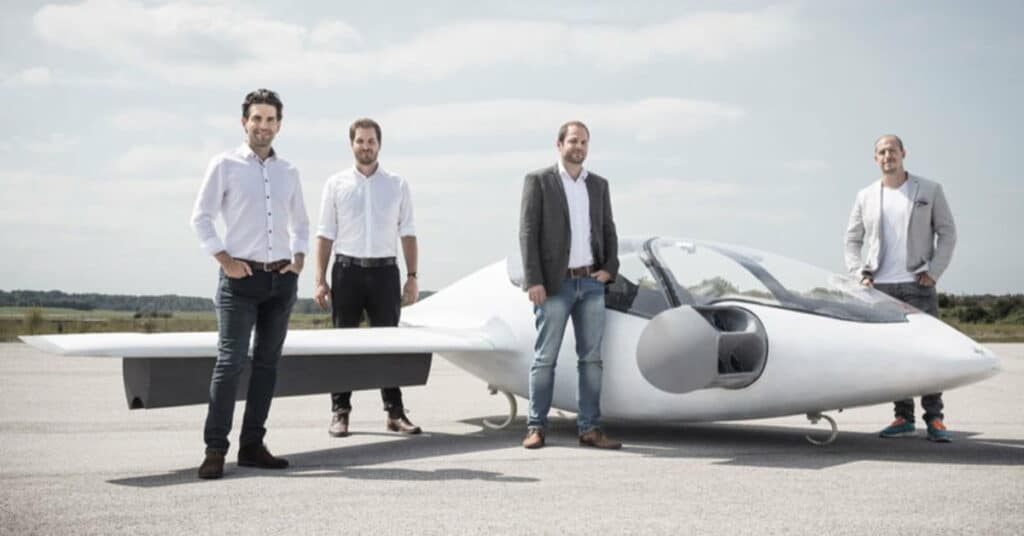Known for its fully electric, 5-seater aircraft Munich-based aviation startup Lilium plans to establish regional air mobility as a new mode of transportation by 2025. In this regard, the company announced a partnership with Dusseldorf and Cologne/Bonn airports to develop the necessary infrastructure to support the regional air services spanning North Rhine-Westphalia.

First of many agreements to come
The partnership was announced in Dusseldorf in the presence of the Transportation Minister of North Rhine-Westphalia Hendrik Wüst. North Rhine-Westphalia Transport Minister Hendrik Wüst explains: “What sounds like science fiction today may soon be a reality. In the federal state with the highest mobility needs, smart ideas for better mobility are always welcome. We need all modes of transport in order to provide people with a convincingly diverse range of mobility options.“
Why North Rhine-Westphalia?
With 18 million inhabitants, North Rhine-Westphalia is the largest and most densely populated German state, including 40 universities and colleges and four international trade fair locations, and 10 cities with over 300,000 inhabitants.
“North Rhine-Westphalia is a model region for the mobility of the future. We want digitally-networked mobility in North Rhine-Westphalia not only to be researched and developed but also experienced as soon as possible. This is why we support and promote many future-oriented projects and research projects here in North-Rhine-Westphalia,” Wüst adds.
According to the company, both Cologne/Bonn and Dusseldorf airports have perfect connections to air, rail, and road traffic, making it an ideal starting point for the development of networked mobility.
“We are excited to bring our innovative service to North Rhine-Westphalia,” says Lilium COO Dr. Remo Gerber. “Cities such as Aachen, Bielefeld, Münster, and Siegen will be directly connected to the region’s largest international airports within 30mins, providing emission-free, high-speed connectivity at an affordable price.”

What do you need to know about 5-seater aircraft!
Co-founded in 2015 by four engineers, Daniel Wiegand (CEO), Sebastian Born, Matthias Meiner and Patrick Nathen, Lilium is an aviation company developing an emissions-free regional air mobility service.
It has designed and prototyped the Lilium Jet, which is a 5-seater, all-electric aircraft that can take-off and land vertically (eVTOL). Since, this signature maneuver is one of aerospace’s most significant challenges, it gives Lilium Jet its range advantage.
Introduced back in May 2019, first flight testing was completed in less than six months. As per the company, the emission-free aircraft has flown at speeds exceeding 100 km/h, in increasingly complex maneuvers.
The Lilium Jet has a top speed of 300 km/h and 60 min flying time. It’s worth mentioning that the jet is powered by 36 all-electric jet engines and has zero operating emissions. Notably, it requires less than 10% of its maximum 2000 horsepower during horizontal cruise flight.
According to the company, the aircraft is being engineered to the requirements of EASA’s (European Union Aviation Safety Agency) SC-VTOL regulations (2019) and their Associated Means of Compliance (2020). It is being certified by EASA in Europe and the FAA in the United States.

Raised €317M funding so far
Lilium has attracted more than $375M (approx €317M) in funding from numerous investors including Atomico, Tencent, Baillie Gifford, LGT, Freigeist and Obvious Ventures. Back in June, the company crossed the €1B valuation, making it one of the most valuable and highly capitalised aviation companies.
Main image credits: Lilium










01
From telecom veteran to Dutch Startup Visa success: The Jignesh Dave story